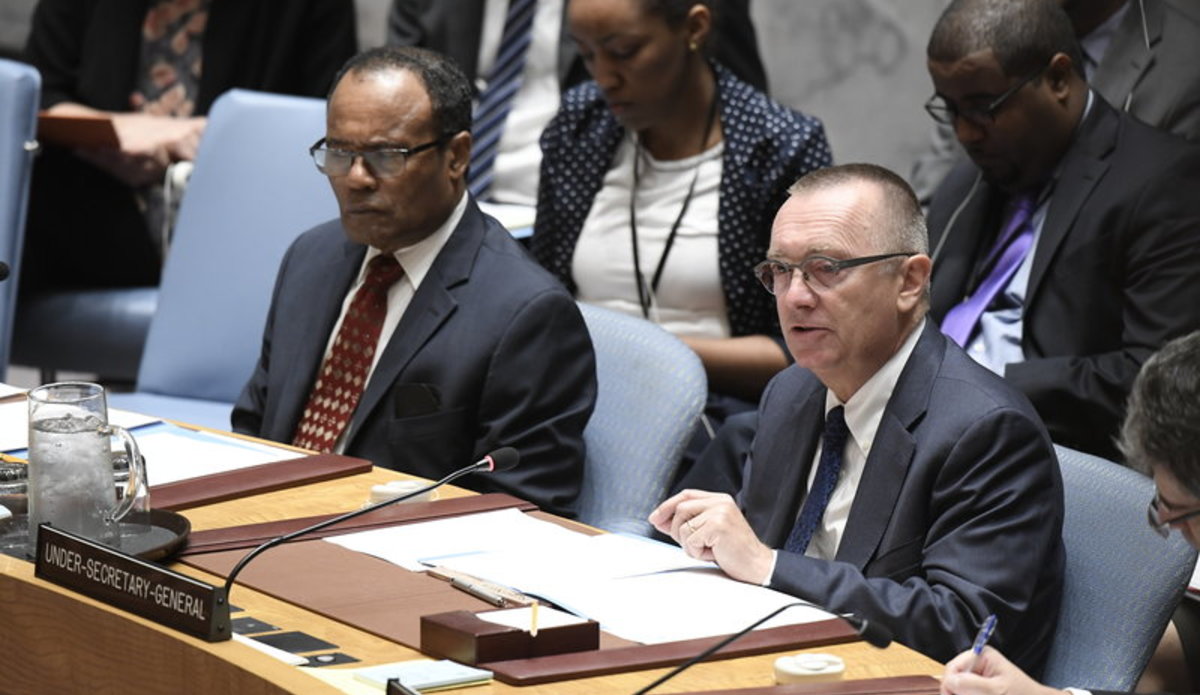Mr. President,
Members of the Security Council,
In a statement by its official news agency on 3 September 2017, the Democratic People’s Republic of Korea (DPRK) announced that it had successfully conducted a sixth nuclear explosive test.
The DPRK characterized the event as a quote “perfect success in the test of a hydrogen bomb for intercontinental ballistic missile (ICBM)” end quote. The DPRK further said that it also – quote – “marked a very significant occasion in attaining the final goal of completing the state nuclear force” end quote.
The Executive Secretary of the Preparatory Commission for the Comprehensive Nuclear-Test-Ban Treaty Organization (CTBTO) in Vienna said in a statement that the organization’s monitoring stations had picked up an unusual seismic event in the area of the site used in the DPRK for its previous nuclear tests.
The CTBTO’s data indicated that the event measured approximately 6.0 in magnitude. Governmental sources from UN Member States measured a yield as high as 6.3. In any case, it is evident the yield of the device was larger than any of the DPRK’s previous nuclear tests. Experts have estimated a yield of between 50 and 100 kilotons, or on average more than five times more powerful than the weapon detonated over Hiroshima and at the low end of the yield of a modern thermonuclear weapon.
The CTBTO detected a second smaller seismic event at the location of the DPRK test site eight and half minutes after the main event. The CTBTO has not yet completed its analysis of this second event, but experts have speculated that it could have been caused by the collapse of the tunnel used in the nuclear test.
Mr. President, in an earlier statement the same day, the DPRK official media reported that their leader had inspected what they claimed to be a hydrogen bomb, which was conspicuously displayed in front of a payload fairing for a Hwasong-14 intercontinental ballistic missile. The DPRK article stated that the hydrogen bomb was quote “a multi-functional thermonuclear nuke with great destructive power which can be detonated even at high altitudes for super-powerful EMP attack” end quote. This was a rare reference by the DPRK to the use of EMP, an electromagnetic pulse, which triggered by a nuclear weapon would aim for widespread damage and disruption to electricity grids and sensitive electronics, including on satellites.
Mr. President, this is the second emergency Security Council meeting on non-proliferation/DPRK in less than a week and the tenth time the Security Council has met to discuss the DPRK this year. On 31 August, the DPRK Foreign Ministry issued a statement to reject the Security Council’s recent Presidential Statement and said that the ballistic missile launch of 29 August was the quote “first step taken by the Korean People’s Army in its Pacific operation and a meaningful prelude to restraining Guam” end quote. There are reports today indicating that the DPRK may be preparing new ballistic missile tests.
Mr. President, we are alarmed by this dangerous provocation. The Secretary-General condemns the underground nuclear test announced by the DPRK. This act is yet another serious breach of the DPRK’s international obligations and undermines international non-proliferation and disarmament efforts. This act is also profoundly destabilizing for regional and international security. The DPRK is the only country that continues to break the norm against nuclear test explosions. The Secretary-General reiterates his call on the DPRK leadership to cease such acts and to comply fully with its international obligations under relevant Security Council resolutions.
Mr. President, the Secretary-General counts on the Security Council to remain united and take appropriate action. As was said in the Security Council meeting last week, as tensions rise, so does the risk of misunderstanding, miscalculation and escalation.
The latest serious developments require a comprehensive response in order to break the cycle of provocations from the DPRK. Such a response must include wise and bold diplomacy to be effective.
As the Council considers its reaction, the Secretary-General reiterates the importance of responding to humanitarian imperatives regardless of the political situation. The people of the DPRK rely on the international community to provide humanitarian assistance to those in need.
We will continue to carefully follow the developments and remain in close coordination with the concerned international organizations, Members of the Council and other governments concerned.
Thank you.

